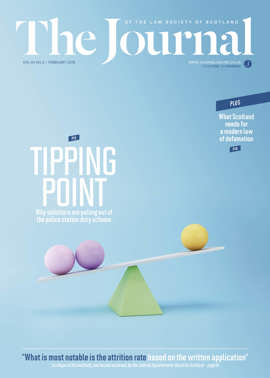Wealth not a bar to s 28 claims

Since the Family Law (Scotland) Act 2006, s 28 introduced the right of cohabitees to make a claim for payment of a capital sum, family practitioners have complained of the absence of clarity on how such claims should be quantified against the stated intention that s 28 was never intended to bestow the same rights as a married person has.
Gow v Grant 2013 SC (UKSC) 1 was heralded as providing some structure. Whigham v Owen [2013] CSOH 29; 2013 SLT 483 endorsed Lady Hale’s dicta in Gow, awarding just under £398,000 after considering the assets value that existed at the beginning and the cessation of cohabitation and whether the defender had derived a net economic advantage from the applicant’s contributions or the applicant had suffered net economic disadvantage in the interests of the other or any relevant child.
Against this background Lord Ericht’s decision M v S [2017] CSOH 151 (12 December 2017) brings not only the most substantial award yet reported but further clarity around quantum of M’s award of £912,000. M, a solicitor, and S, a property developer, cohabited for 19 years. They had two children. S had two adult children from a previous marriage. At the start of cohabitation M had net assets of £127,500; S was held to have had £102,000. At cessation, M was a highly paid equity partner working part time (80%) and had net assets in her own right valued at £1,085,721 (an increase of £958,221). Amongst other things, S claimed M had clothing worth £20,000. Lord Ericht found it was unnecessary for a party to account for the value of everything in his or her possession including used clothes, and refused to include any figure in the calculation for clothing. He found S to have increased his asset worth by £5,589,624, preferring the expert evidence of M’s expert to that of S’s business accountant in refusing to apply a discount for a minority interest in S’s share of a limited liability partnership. Only M’s expert was considered a truly independent expert presenting a well reasoned opinion (cf Watt v Watt 2009 SLT 931).
Basis of claim
There were two elements to M’s claim. One was based on her reduced earnings to her disadvantage due to her reduced working hours. She did not found it on her not having furthered her career during the children’s childhood but only in respect of the difference between a full-time and a part-time partner. She accepted that would be half the difference, calculated at £367,868.
M’s second element related to a farm owned by S. They had lived there for almost all of their relationship and M claimed she had paid half the monthly mortgage payments. She sought half the increase in net value less any capital contributions by S, valuing her claim at £544,000. During the cohabitation, M had paid £600 per month more than S into the parties’ joint account, representing half what S had said was the mortgage payment. S attempted to lodge detailed spreadsheets for joint and his own expenditure, claiming he had paid a significantly increased contribution for joint purposes of £469,000. Lord Ericht found that some of the entries were expressly stated to be estimates and rejected this exercise as precisely what Lady Hale and Lord Hope had warned against in Gow, preferring again to deal with this on a “rough and ready” basis, and concluding that there was no economic disadvantage to S arising from sole expenditure by him for joint purposes.
M’s claim amounted in total to £912,000. S argued that his contributions during and after cohabitation had alleviated the economic burden pertaining to the children. M had been able to pursue a very lucrative career and fairness would be achieved by refusing to make any order.
Fair approach
Lord Ericht concluded that whether to exercise the court’s discretion required consideration of the parties’ particular circumstances. The fact that both had successful careers and substantial assets did not mean that no order was merited. The purpose of s 28 was not “the relief of one of the parties from poverty”. Two particular disadvantages should be compensated: first in relation to the farm, and secondly in relation to part-time working, which Lord Ericht viewed through the prism of fairness. As regards the farm, M had taken a fair approach to the calculation of offsetting advantages and disadvantages. Further, in undertaking part-time working, she had suffered economic disadvantage in the interests of the children and the principle of fairness did not cease to apply merely because she could have worked full-time and bought in childcare.
This is a welcome clear and reasoned decision where the rough and ready approach was taken to some values in evidence but where it could be said that a somewhat more forensic analysis was then applied in two distinct areas, resulting in a very substantial award. Wealth is not a bar to s 28 claims. However the decision is being reclaimed, so watch this space.
In this issue
- Enforceable rights or progressive policy goals?
- Data processors beware: GDPR holds you responsible too
- Insolvency in a post-Carillion world
- Employee ownership: a strategy that fits
- A mediation Act? The Irish experience
- Journal magazine index 2017
- Reading for pleasure
- Opinion: Andrew Tickell
- Book reviews
- Profile
- President's column
- Digital progress given go ahead
- People on the move
- Tipping point for legal aid?
- Arrest: all change
- Legal software: are you still listening to Gangnam style?
- Defamation law for the digital age
- Choosing our judges: could we do it better?
- A journey through trust compliance
- The Cashroom: 10 years of service
- From dockets to defences
- Sex discrimination runs deep
- Wealth not a bar to s 28 claims
- No spying on the job
- Scottish Solicitors Staff Pension Fund: not the final instalment?
- Scottish Solicitors' Discipline Tribunal
- The Clark Foundation for Legal Education
- LBTT's birthday alert
- Doing all the white stuff
- Solicitor's CBE for life of service
- From the Brussels office
- Paralegal pointers
- Public policy highlights
- The kindest cut
- Wish list for the review
- Benchmarking: take the benefits
- Tax evasion: don't get caught up
- Ask Ash
- Time to call out harassment
- Q & A corner






